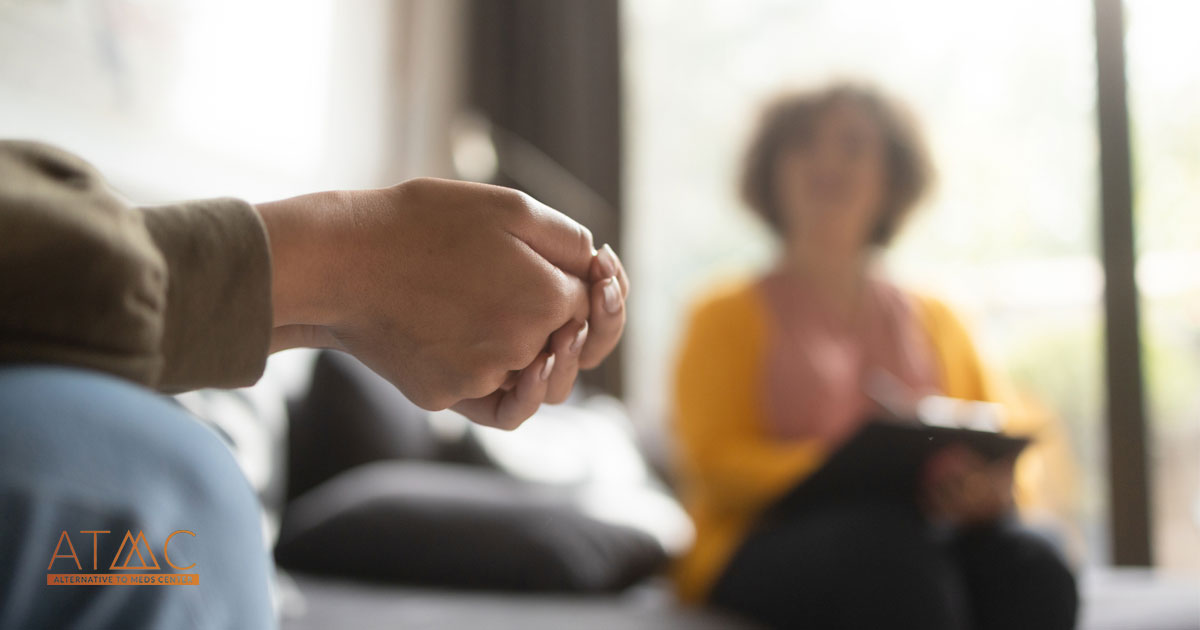Last Updated on March 22, 2024 by

Written by Lyle Murphy
Medically Reviewed by Dr Samuel Lee MD

Last Updated on March 22, 2024 by

Written by Lyle Murphy
Medically Reviewed by Dr Samuel Lee MD

Inpatient counseling for mental health was developed specifically for individuals attending an inpatient treatment program and struggling with their mental health, whether due to trauma or recovery from addiction or medication usage. The purpose of inpatient counseling is to equip the individual with the tools and coping mechanisms to support them through low points of mental health. Whether the mental health symptoms have occurred due to a traumatic event or recovery from medication toxicity and SUD, counseling can help with the healing process.
Of course, both inpatient and outpatient counseling are therapy programs developed to offer the support and tools individuals need to reach their health and recovery goals. However, inpatient counseling offers more intensive care as individuals are already receiving round-the-clock treatment for mental health and SUD issues. Participating in a residential rehabilitation and therapy program offers individuals more opportunities to fully take advantage of the care they are receiving before they are exposed to the outside world.
Like many other therapies, inpatient counseling works over time and requires a commitment from both the individual and the counselor. This commitment is to actively participate in the recovery process and work to reach their goals. Inpatient mental health treatment is an important strategy to help clients reach their health and recovery goals here at Alternative to Meds Center.
The inpatient counseling offered at Alternative to Meds Center is designed to treat the whole unique individual. This approach allows for each person to participate in treatment that is personalized for them and their health journey and goals. Our philosophy of care blends neurotransmitter rehabilitation with other holistic methods to help clients feel good naturally. This can only occur after a thorough individual assessment of each person and then assembling the best treatments for their needs.
A critical focus at ATMC is treatment without medication. For example, accumulated toxins in the body are often overlooked causes of symptoms and can result in misdiagnoses.8 Masking mental health symptoms with medication can cause far more harm than good, not only because it doesn’t provide the healing needed but because it can also create additional physical and mental health symptoms. Therefore, we focus our offerings on holistic adjunctive therapies that do not rely on medication. We believe that treating the whole person and taking a holistic approach to creating treatment plans is what allows our clients to finally address the root of their symptoms.
The team of mental health providers at Alternative to Meds Center works hard to provide the best care possible to each and every person who crosses our threshold. Their expertise in several therapeutic disciplines allows them to offer a variety of therapies to their patients. Within the inpatient counseling program, we offer multiple different services and therapies.
Cognitive behavioral therapy is one of the most widely used “talk” therapies for addiction because research has proven it to be one of the most effective. CBT is especially useful for improving self-efficacy (the confidence that one can control their own behavior) and helping individuals eliminate addiction.9 The aim of cognitive behavioral therapy is to help clients make connections between their thoughts and feelings and how they drive addictive behaviors. Through this understanding, clients can begin to make changes that impact recovery.
Dialectical behavior therapy is based on cognitive behavioral therapy, but shaped to help those individuals who experience extremely intense emotions. Through DBT, clients can learn to understand the relationship between intense negative emotions and harmful behaviors. Instead of engaging in harmful behaviors to mask these emotions, dialectical behavior therapy helps individuals find healthy ways to cope. Research has demonstrated that after engaging in dialectical behavior therapy, individuals were better able to tolerate stress, experienced improved mental health states and self-efficacy, and were less likely to use substances.10
The social cognitive theory behind therapy focuses on how behavior can be driven by a number of things, both behavioral and cognitive. This can include environmental factors and the behavior of others in addition to personal experiences and emotions. By exploring the individual more holistically, a therapist can help a client understand that they are not a passive reflection of the things that happen to them and can foresee – and control – the eventual consequences of each behavior. Individuals participating in therapies based on social cognitive theory are not only less likely to experience relapse, they also experience improvements in self-efficacy.11
Choice theory is the basis for reality therapy. This theory posits that although humans cannot control other people, much about their environment, or how they feel about any of it, they can control the choices they make to deal with each of these aspects. Thus, the best way to avoid negative consequences is to seek ways to control behavior. Choice theory is backed by years of data that states that most people who successfully reach recovery do so because they want to eliminate problems in their life, whether medical, psychological, or social.12
Similar to social cognitive theory, reality therapy recognizes that the behavior of human beings is ultimately a choice. Mental health symptoms, as a result, are not necessarily caused by an incurable mental health disorder but by unfulfilled needs. This therapy helps individuals understand that while they cannot control their thoughts or feelings, they can control how they respond to them. Reality therapy has been shown to reduce symptoms of anxiety, depression, and stress in individuals with substance use disorder.13
This therapeutic modality is based on structural family system theory, which places an intense focus on the interactions and relationships between family members. Therapists begin by helping family members improve their communication skills. Eventually, the therapist helps the family examine the social structure by which the family operates and make changes to any components that are negatively affecting communication and the overall relationships. With the integration of family system therapy into a treatment plan, clients are more likely to experience favorable treatment outcomes, lasting recovery, and better relationships; this therapy can also help reduce the impact of substance use disorder on family members.14
As the name suggests, one-on-one addiction counseling occurs on an individual basis (as opposed to group counseling) and focuses primarily on the factors that surround a person’s addiction. The above-listed therapeutic modalities may be used in addiction counseling depending on the client’s needs, with the intent to identify and address the root contributors to that individual’s relationship with a substance. Addiction counseling can also help the individual develop healthy coping skills to address the elements that drove addiction, and is especially effective when combined with therapies like CBT for co-occurring disorders like PTSD.15
While Gestalt therapy is centered around helping an individual focus on the present rather than dwelling on the past and obsessing over the future, Gestalt equine-assisted therapy takes this approach a step further. With the help of equine animals like horses, clients can explore the feelings that may have been masked by other feelings, worries, or stress. Developing a mutually trust-driven relationship with a horse can help an individual to process these emotions, improve emotional regulation, and even build confidence in their ability to develop mutual trust in their own human relationships.1617
Similar to Gestalt therapy, the purpose of mindfulness is to help individuals focus on the here and now. The intent is to help focus and accept the thoughts and feelings they are having in the moment and develop healthy ways to address those thoughts and feelings instead of avoiding them with substance use. Mindfulness practices can be put to use after recovery has begun when cravings, triggers, and other stressors occur.18
Each provider works closely with their clients to develop practical strategies to achieve the mental health goals they want to reach. This expertise and attention of our staff providers is what makes Alternative to Meds Center the right choice for inpatient counseling. Our commitment to each unique individual patient makes us stand out among other inpatient treatment centers.
One of the core pillars of the Alternative to Meds Center treatment techniques and processes is taking a holistic approach to the treatment for the individual. The providers at ATMC take every aspect of the individual into account while creating treatment plans and during the entire recovery process. At ATMC, we help people become the best version of themselves through a journey of self-discovery, lifestyle choices, and new insights. An important aspect of our holistic approach to inpatient counseling and therapy is the rejection of the “Disease Model of Addiction.” The “Disease Model” is the idea that people struggling with addiction have a chronic, permanent brain disease and need to be prescribed medication, either long-term or for life, to change their behavior.7 We reject this idea and instead aim to help our clients heal without toxic medications.
As mentioned, one of the most critical components of inpatient counseling is cognitive behavioral therapy. The umbrella of CBT has a variety of different therapies and techniques that can be personalized to fit each person’s needs. For example, for a person struggling with compulsions and/or obsessive behaviors, practicing mindfulness and choice therapy may help them control their negative urges.
That’s why there is no “one size fits all” treatment plan when struggling with mental health and addiction. Here at Alternative to Meds Center, we work to personalize each patient’s care plan to help them become the best version of themselves.

Reaching out for help can be the hardest step to take in your SUD and mental health journey. If you or a loved one is struggling and ready to take the step towards recovery, Alternative to Meds Center is here to help. Contact our team to learn more about how our inpatient counseling and personalized recovery services can help you become the best version of yourself.
Reach out to us today to get more information and understand how we can assist you or a loved one.
1. Strengthening Mental Health Promotion Fact sheet no. 220. Geneva, Switzerland: World Health Organization.
2. Chronic Illness & Mental Health Bethesda, MD: National Institutes of Health, National Institute of Mental Health. 2015.
3. Kessler RC, Angermeyer M, Anthony JC, et al. Lifetime prevalence and age-of-onset distributions of mental disorders in the World Health Organization’s World Mental Health Survey Initiative. World Psychiatry. 2007;6(3):168-176.
4. Key substance use and mental health indicators in the United States: Results from the 2015 National Survey on Drug Use and Health. Rockville, MD: Center for Behavioral Health Statistics and Quality. Substance Abuse and Mental Health Services Administration. 2016.
5. Merikangas KR, He J, Burstein M, et al. Lifetime Prevalence of Mental Disorders in US Adolescents: Results from the National Comorbidity Study-Adolescent Supplement (NCS-A). Journal of the American Academy of Child and Adolescent Psychiatry. 2010;49(10):980-989. doi:10.1016/j.jaac.2010.05.017.
6. Key substance use and mental health indicators in the United States: Results from the 2015 National Survey on Drug Use and Health. Rockville, MD: Center for Behavioral Health Statistics and Quality. Substance Abuse and Mental Health Services Administration. 2016.
7. MacKillop J. Is Addiction Really a Chronic Relapsing Disorder?: Commentary on Kelly et al. “How Many Recovery Attempts Does It Take to Successfully Resolve an Alcohol or Drug Problem? Estimates and Correlates From a National Study of Recovering U.S. Adults”. Alcohol Clin Exp Res. 2020 Jan;44(1):41-44. doi: 10.1111/acer.14246. Epub 2019 Dec 24. PMID: 31758562; PMCID: PMC7739524.
8. Genuis SJ. Toxic causes of mental illness are overlooked. Neurotoxicology. 2008 Nov;29(6):1147-9. doi: 10.1016/j.neuro.2008.06.005. Epub 2008 Jun 24. PMID: 18621076.
9. Kamarzarin, H., Zaree, H., & Brouki, M. (2012). The effectiveness of cognitive behavioral therapy on increasing of self-efficacy and improving of addiction symptoms among drug dependency patients. Scientific Quarterly Research on Addiction, 6(22), 75-85.
10. Basereh, S., Safarzadeh, S., & Hooman, F. (2022). The Effectiveness of Group Dialectical Behavior Therapy and Structured Matrix Treatment on Quit Addiction Self-efficacy, Distress Tolerance, and Mindfulness in Individuals with Stimulant Drug Abuse. Journal of Health Reports and Technology, 8(4).
11. Heydari, A., Dashtgard, A., & Moghadam, Z. E. (2014). The effect of Bandura’s social cognitive theory implementation on addiction quitting of clients referred to addiction quitting clinics. Iranian journal of nursing and midwifery research, 19(1), 19–23.
12. Heyman, G. M. (2013). Addiction and choice: theory and new data. Frontiers in psychiatry, 4, 31.
13. Massah, O., Farmani, F., Karimi, R., Karami, H., Hoseini, F., & Farhoudian, A. (2015). Group reality therapy in addicts rehabilitation process to reduce depression, anxiety and stress. Iranian Rehabilitation Journal, 13(1), 50-44.
14. Bacon, M. (2019). Family therapy and the treatment of substance use disorders: The family matters model. Routledge.
15. McGovern, M. P., Lambert-Harris, C., Alterman, A. I., Xie, H., & Meier, A. (2011). A randomized controlled trial comparing integrated cognitive behavioral therapy versus individual addiction counseling for co-occurring substance use and posttraumatic stress disorders. Journal of dual diagnosis, 7(4), 207-227.
16. White-Lewis S. (2019). Equine-assisted therapies using horses as healers: A concept analysis. Nursing open, 7(1), 58–67.
17. Raffagnino, R. (2019) Gestalt Therapy Effectiveness: A Systematic Review of Empirical Evidence. Open Journal of Social Sciences, 7, 66-83.
18. Garland, E. L., & Howard, M. O. (2018). Mindfulness-based treatment of addiction: current state of the field and envisioning the next wave of research. Addiction science & clinical practice, 13(1), 1-14.

Dr. Samuel Lee is a board-certified psychiatrist, specializing in a spiritually-based mental health discipline and integrative approaches. He graduated with an MD at Loma Linda University School of Medicine and did a residency in psychiatry at Cedars-Sinai Medical Center and University of Washington School of Medicine in Seattle. He has also been an inpatient adult psychiatrist at Kaweah Delta Mental Health Hospital and the primary attending geriatric psychiatrist at the Auerbach Inpatient Psychiatric Jewish Home Hospital. In addition, he served as the general adult outpatient psychiatrist at Kaiser Permanente. He is board-certified in psychiatry and neurology and has a B.A. Magna Cum Laude in Religion from Pacific Union College. His specialty is in natural healing techniques that promote the body’s innate ability to heal itself.

Lyle Murphy is the founder of the Alternative to Meds Center, a licensed residential program that helps people overcome dependence on psychiatric medication and addiction issues using holistic and psychotherapeutic methods.
Can you imagine being free from medications, addictive drugs, and alcohol? This is our goal and we are proving it is possible every day!
Read All StoriesView All Videos